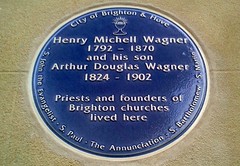Arthur Douglas Wagner
Arthur Douglas Wagner
(1824-1902)
Commemorated on 1 plaque
Henry Michell Wagner 1792 - 1870 and his son Arthur Douglas Wagner 1824 - 1902 Priests and founders of Brighton churches lived here
Sixth Form College, Temple Gardens, Brighton, United Kingdom where they lived

